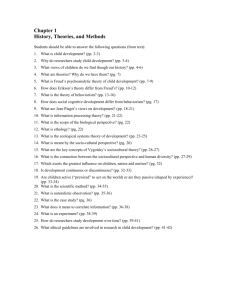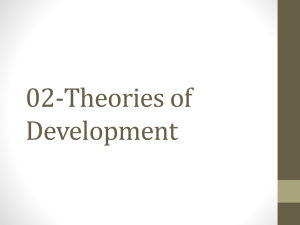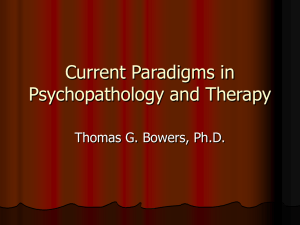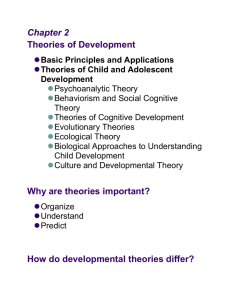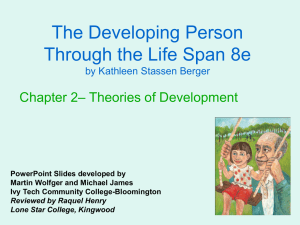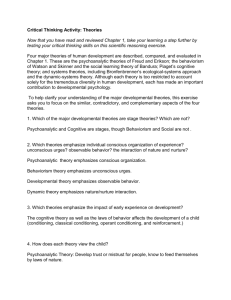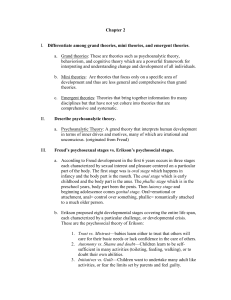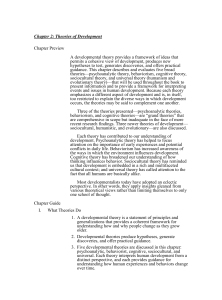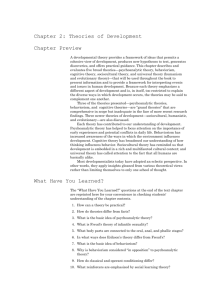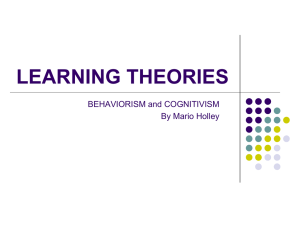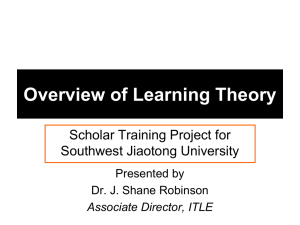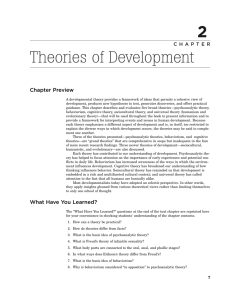Invitation to the Life Span by Kathleen Stassen
advertisement
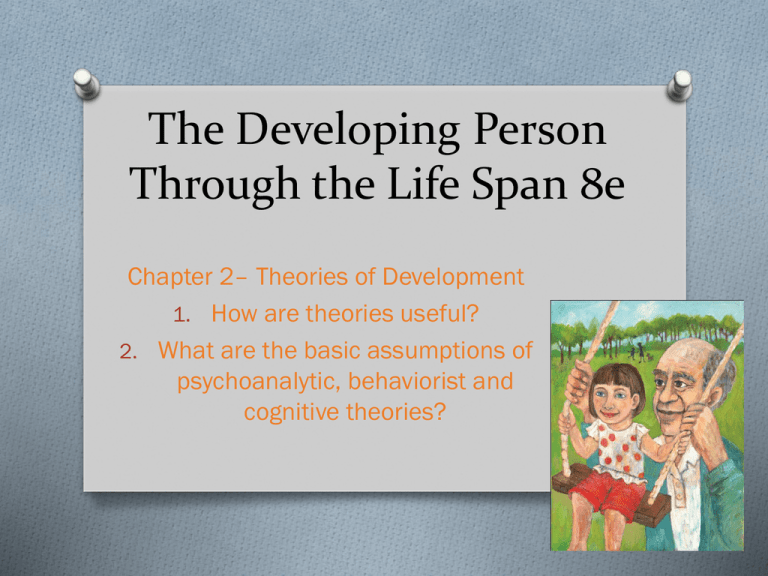
The Developing Person Through the Life Span 8e Chapter 2– Theories of Development 1. How are theories useful? 2. What are the basic assumptions of psychoanalytic, behaviorist and cognitive theories? What Theories Do Developmental Theory O a systematic statement of principles and generalizations O provides a framework for understanding how and why people change as they grow older. O Theories O form basis for hypotheses that can be tested by research studies O formulating _________________________ is more difficult that finding right answers O generate discoveries O offer insight and guidance by providing coherent view A little history…. O 16thCentury: Preformationism Children were viewed as miniature allready formed adults. 17th Century John Locke Forerunner to Behaviorism “We can train children” Tabula rasa: Parents could “mold” their child through careful instruction, good examples and rewards for good behavior. His approach led to a change from harshness to kindness. Did he believe Nature or Nurture were more important? 18th Century O Jean Jacques Rousseau O Child-centered approach O Noble Savages: O Children had a natural map for growth O Adult training would HURT growth O Which did he believe was more powerful? Nature or Nurture? 18th and 19th Century O John Tetens and Frederich Carus urged that attention to development be extended through adulthood. Grand Theories O Psychoanalytic O Behaviorism (learning theory) O Cognitive O grand in that they are… Psychoanalytic Theory A theory of human development that holds that irrational, unconscious drives and motives, often originating in childhood, underlie human behavior. Psychoanalytic Theory O Psychoanalytic theory originated with Sigmund Freud (1856– 1939) O Introduced “stages” in childhood O how a person experiences and resolves conflicts determines personality and patterns of behavior O Did not believe in “stages” in adulthood Erikson – 1902-1994 O a follower of Freud, interested in O culture diversity O social change O psychological crises Psychoanalytic Theory Erickson’s Ideas O Described eight developmental stages, each characterized by a challenging developmental crisis. O His first five stages build on Freud’s theory; but he also described three adult stages. Erickson’s Ideas: Like Freud, believed problems in adult life may stem from unresolved conflicts of childhood Unlike Freud, Erikson stressed relationships rather than sexual urges Psychoanalytic Theory Erikson – 1902-1994 O O Described eight developmental stages 1. 2. 3. 4. 5. 6. 7. 8. Trust vs. Mistrust Autonomy vs. Shame and Doubt Initiative vs. Guilt Industry vs. Inferiority Identity vs. Role Confusion Intimacy vs. Isolation Generativity vs. Stagnation Integrity vs. Despair Behaviorism O Watson 1878 – 1958 1. Began the American study of behaviorism 2. Studied “directly observable” stimuli and response behavior 3. Built upon Classical Conditioning (Pavlov’s Dog) Behaviorism O Also called learning theory as it describes the laws and processes by which behavior is learned. WE CAN TRAIN CHILDREN… OR ANYONE! Behaviorism O Classical Conditioning: O Adults could mold children’s behavior by controlling stimulusresponse associations O Little Albert/White Rat Behaviorism B.F. Skinner (1904-1990) O Operant Conditioning O Behaviors can be increased by using reinforcers O Reinforcers are: O Praise O Food O Rewards O Behaviors can be decreased by using punishments O Punishments are: O Withdrawal of privileges O disapproval Behaviorism Social Learning Theory- Albert Bandura (b. 1925) O an extension of behaviorism that emphasizes the influence that other people have over a person’s behavior, i.e. groups O Modeling O A person observes the actions of others and then copies them O Most likely to occur if model is admired or observer is inexperienced Cognitive Theory O Thoughts and expectations profoundly affect action. O Focuses on changes in how people think over time. O Jean Piaget (1896– 1980) Children develop as they actively ____________________ ___________________ the environment Children develop in Children’s understanding is very ____________ from adult’s Cognitive Theory O Jean Piaget’s 4 Stages O sensorimotor O pre-operational O concrete operational O formal operational 20 Cognitive Theory O Piaget loved BIG WORDS. Here are some of them! O Cognitive equilibrium—state of mental balance. O Assimilation: incorporate new events into existing schemas O Accommodation: change ideas O If threatened, how do we achieve equilibrium again? 21 Cognitive Theory Information Processing O Not a single theory but a framework O Inspired by how a computer works O How people think before they respond O How attention and thought affects mental function O Relationship between one person’s thinking and another’s Newer Theories Sociocultural Theory O Lev Vygotsky (1896-1934) O Development results from a person’s interaction with their social and cultural surroundings O Culture is integral to development O Apprenticeship in thinking: how cognition is “taught” by the older and more skilled Sociocultural Theory The Zone of Proximal Development O Zone of proximal development— the range of skills a learner can perform with assistance but not independently O learner is drawn into learning by teacher 1. 2. How would you teach a 5 year old to ride a bike? How would you teach a young child how to use a nebulizer? The Universal Perspective Humanism “Humans are, at the basic level, alike” O Abraham Maslow (1908-1970 O Stresses the potential of humans for good O All people have the same needs (p. 51) O Emphasize what people have in common The Universal Perspective Humanism “Hate the sin but love the sinner” O Carl Rogers (1902-1987) O Accept and respect one’s personhood O People are innately good, but may not always make good choices The Universal Perspective Evolutionary Theory O Based on Darwin’s ideas O Very controversial in psychological circles O Humans are more alike than different O Human development influenced by drives to survive and reproduce O Selective adaptation: process by which people adapt to their environment What Theories Contribute O Eclectic perspective O The approach taken by most developmentalists O Aspects of each of the various theories of development are applied rather than adhering exclusively to one What Theories Contribute O Psychoanalytic theory has made us aware of the importance of early childhood experiences. O Behaviorism has shown effect of the immediate environment on learning. O Cognitive theory shows how intellectual process and thinking affect actions. O Sociocultural theory has reminded us of the importance of culture in learning. O Universal Theories stress that human differences are less significant than what all humans, in every place and era, share. 30
